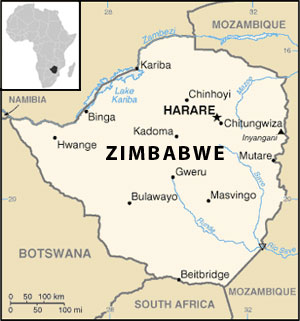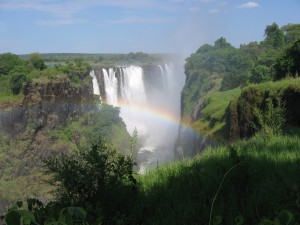 Zimbabwe is home to the Victoria Falls, one of the natural wonders of the world, the stone enclosures of Great Zimbabwe – remnants of a past empire – and to herds of elephant and other game roaming vast stretches of wilderness.
Zimbabwe is home to the Victoria Falls, one of the natural wonders of the world, the stone enclosures of Great Zimbabwe – remnants of a past empire – and to herds of elephant and other game roaming vast stretches of wilderness.
This landlocked plateau country in southern Africa takes its name from Great Zimbabwe, a fortified trading hub built in medieval times by the Shona tribe. In 1890 the first British settlers arrived; colony status came in 1923 under the name Southern Rhodesia. In 1965 the white minority government unilaterally declared independence, as Rhodesia. International sanctions and guerrilla warfare against the illegal regime led to legitimately independent Zimbabwe in 1980.
The economy centers on farming, mining and manufacturing. Until drought struck in the early 1990s, the nation fed itself. For years it was a major tobacco producer and a potential bread basket for surrounding countries. However recent events have led to rampant inflation and critical food and fuel shortages. The U.S. dollar was introduced as the primary currency in 2009, however the economy continues in crisis mode with high unemployment rates.
Primarily of the Bantu group of south and central Africa, the black Zimbabweans are divided into two major language groups, which are subdivided into several ethnic groups. The Mashona (Shona speakers), who constitute about 75% of the population, have lived in the area the longest and are the majority language group. The Matabele (Sindebele speakers), representing about 20% of the population and centered in the southwest around Bulawayo, arrived in within the last 150 years. An offshoot of the South African Zulu group, they maintained control over the Mashona until the white occupation of Rhodesia in 1890.
More than half of the white Zimbabweans, primarily of English origin, arrived in Zimbabwe after World War II. Afrikaners from South Africa and other European minorities, including Portuguese from Mozambique, also are present. Until the mid-1970s, there were about 1,000 white immigrants per year, but from 1976 to 1985 a steady emigration resulted in a loss of more than 150,000, leaving about 100,000 in 1992. Renewed white emigration in the late 1990s and early 2000s reduced the white population to less than 50,000. English, the official language, is spoken by the white population and understood, if not always used, by more than half of the black population.
Sources: The World Fact Book, National Geographic & BBC News
